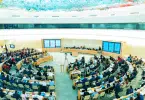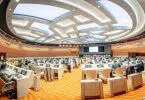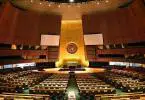The United Nations Institute for Training and Research (UNITAR) just launched its first comprehensive course “Diplomacy 4.0 – Beyond the Digital Frontier”, describing innovative modes and methods of conducting diplomacy with the help of the Internet.
In this course you will explore how internet governance, artificial intelligence and cyber security are shaping and influencing diplomatic relations. You will learn how you can use tools and technologies to engage in digital diplomacy and achieve diplomatic goals.
Humankind is indisputably entering a new digital era. The impact of rapid technological and scientific advances on our professional and everyday lives is so great that World Economic Forum’s Professor Klaus Schwab termed this process as the Fourth Industrial Revolution. We are the witnesses of the transcendence through new frontiers.
These new frontiers go beyond traditional understanding of virtually every aspect of human activity. Unlike in the past, diplomacy and international affairs can no longer afford to slowly adapt to those changes as their pace demands almost business-like agility to stay abreast and relevant.
The e-learning course is taught by subject matter experts, think tanks and policy-practitioners to provide participants with a well-rounded primer to the challenges and opportunities facing actors in international affairs today and tomorrow.
As a participant of this course you will have the opportunity to become part of a global community of learners to discuss some of the most pressing issues of current and future diplomatic relations. The discussions in this course are facilitated by moderators with broad experience in the field.
In the six-week course you will explore the connections between diplomacy and areas of artificial intelligence, cybersecurity, scientific advancements, digitalisation, internet governance and other significant issues, preparing you to join the next generation of international affairs professionals.
The Diplomacy 4.0 e-Learning course is geared towards anyone working in international affairs or aspiring to do so. This may include young professionals, diplomats, other government officials and participants from the broader diplomatic community, including private sector, civil society and students.






